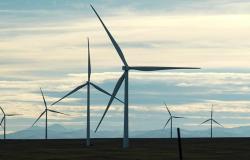
To achieve the objective, the Ministry of Ecological Transition intends to reduce the share of fossil fuels in France's final consumption and develop renewable energies.
France confirms its objective of reducing its gross greenhouse gas emissions by 50% by 2030 compared to 1990, and aims to significantly reduce the share of fossil fuels in its final consumption by 2030, announced the Ministry of Ecological Transition this Monday, November 4.
The share of fossils (oil, gas, etc.) in its final consumption will increase from 60% in 2022 to 42% in 2030, according to the Multi-Annual Energy Program (PPE), the roadmap for French energy policy on ten years to come, and the National Low-Carbon Strategy (SNBC). It will be 30% in 2035.
To move away from fossil fuels, France will have to consume more electricity. The share of electricity (essentially decarbonized in France due to its nuclear power) in final energy consumption will thus evolve in the opposite direction, going from 27% in 2022 to 34% in 2030 and 39% in 2035.
A doubling of the wind farm by 2035
These two texts also confirm the launch of a program for the construction of new generation nuclear reactors (EPR2) and recovery of the availability of the existing fleet in order to reach a production level of at least 360 TWh/year, compared to 320 .4 TWh in 2023 and 279 TWh in 2022.
Renewable energies will play an important role in this perspective of decarbonization, with in particular a multiplication up to 6 times of the installed power of photovoltaic energy in 2022. “The objective is to increase the rate of development of solar power to at least 5 .5 GW/year, compared to 3 GW/year in the previous PPE”, indicates the text.
The government intends to maintain the current pace of development of onshore wind power, with a goal of installing 1.5 GW of additional capacity each year. This rate would allow the current fleet to be doubled by 2035, to 40 GW of installed power compared to 21 GW in 2022.
Finally, for offshore wind power, the government confirms the production objective of 18 gigawatts (GW) in 2035, “i.e. more than 10% of the country's carbon-free electricity production”, compared to 1.5 GW today. today. Finally, it expects a reduction in energy consumption of 30% in 2030 compared to 2012 and 50% in 2050.





